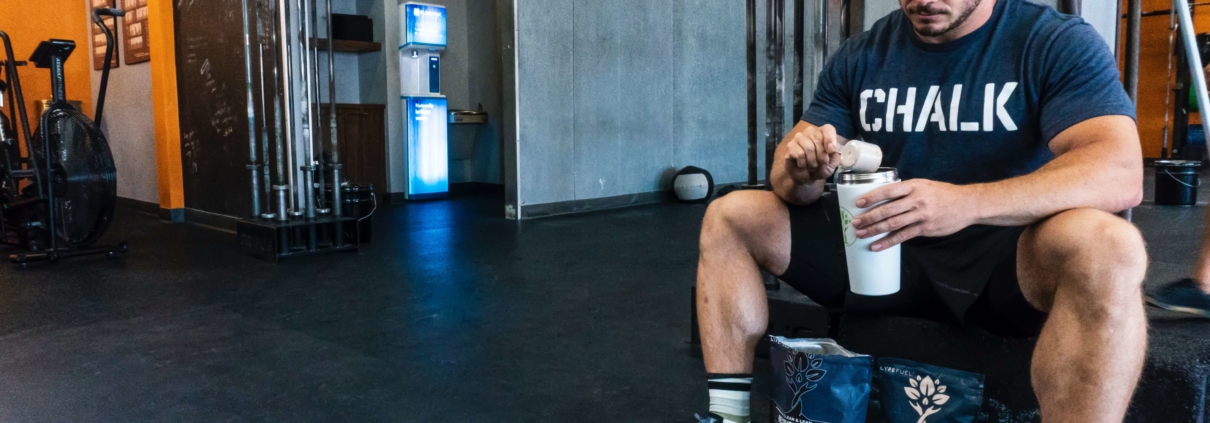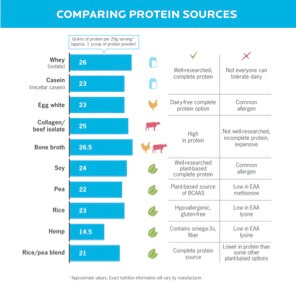What’s The Best Protein Powder For You?
Not all protein powders are created equal. Some are definitely better than others.
With all the options out there, it can be hard to know which is the right powder for you. We all have different goals, genetic make-up and preferences, so there is no one single powder that is best for everyone.
Why Protein Matters
The main reason to use protein powder is to help you hit your protein intake goals.
While most Americans are not protein deficient, they are eating the bare minimum. The bare minimum protein requirement is estimated to be 0.8 grams per kilogram (kg) of body weight, or 0.36 grams per pound.
So at the absolute minimum, a 160-pound person needs about 58 grams of protein to prevent protein deficiency.
Benefits of Protein
- Appetite control – keeps you full longer
- Management of weight and body composition
- Maintenance of muscle growth
- Improved strength
- Better immune function as protein is the building blocks of antibodies
- Faster exercise recovery
Consider Adding Protein Powder to Your Diet
Protein from whole foods is ideal. However, it’s just not always possible to get all the protein you need from whole foods.
There are two big reasons that you might want to consider adding protein powder to your diet:
- Convenience: You don’t have time to sit-down and eat a whole-food meal due to busy schedule and/or traveling with limited options. Or, maybe you are aiming for a very high protein diet and don’t have time / desire to eat that much food. Perhaps you are transitioning to a plant-based diet and are still figuring out how to get in your daily protein requirements.
- Appetite: You’re trying to gain weight or improve athletic performance, but struggling to increase protein intake due to lack of hunger. Or, maybe you become sick and lose desire to eat.
Choose a Core Protein Source
If you have decided that protein powder is right for you, here are some are things to help get you started on choosing one that is appropriate for you.
Animal Based Protein Powders
- Whey is one of the most commonly used proteins. It’s usually recommended for post-workout shakes because it’s fast digesting and rich in branched-chain amino acids (BCAAs).
- Casein is said to be the best to use before bed, since it digests more slowly.
Both are well-studied and are reliable choices, so choose which ever one you prefer as it’s the total intake across the day that matter the most, for most of us. Now if you are allergic to dairy, these will not be good options for you!
Other Animal Proteins
- Egg Whites – Similar to whey in that they are absorbed quickly and contain a high amount of leucine (an essential amino acid).
- Collagen – This is very popular right now as a skin, joint, bone and gut health supplement. However, it has not been well studied as a protein supplement and is considered an incomplete protein as it does not contain all nine essential amino acids.
- Bone Broth – This is similar to collagen peptides as it’s not a complete source of protein, but maybe helpful for increasing protein intake if you can not have dairy or soy.
Plant-Based Protein Powders
- Soy protein is a complete protein that is effective for promoting muscle growth and may have benefits for cardiovascular disease. Soy is a common allergen, so this may also factor into your decision.
- Pea protein is highly digestible, inexpensive, and rich in lysine, arginine, and glutamine. It’s a great option for vegans, vegetarians, those with lactose intolerance, and individuals allergic to eggs or dairy.
- Rice protein is made from brown rice. It can be a good option for anyone with food allergies, as it’s free of wheat, gluten, eggs, nuts, peanuts, soy, and dairy. It’s often cheaper than some of the other plant-based options.
- Hemp protein is high in fiber and provides omega-3 fats. Like rice and pea protein, hemp is an incomplete protein.
Matching a Powder to Your Needs
Be mindful of your goal and what are you hoping to get out of your protein shakes.
Some guidelines to consider:
Weight Loss / Fat Loss
The best protein powder for weight loss will be higher in protein and lower in carbs and fat. Look for those with no added sugars. Ideally, choose a protein powder that has fewer than five grams of sugar per serving
Muscle Gain
To put on muscle, look for a protein powder with a high protein-to-calorie ratio. If you’re struggling to get adequate overall calories, a protein powder that’s also rich in carbohydrates can be helpful around workouts. Whey protein and whey isolates are good options.
Meal Replacement
If you plan to use your protein shake as a meal replacement, make it a super shake by adding in fruit, vegetables, a healthy fat, and more. The goal is to get all the whole-foods benefits of these ingredients.
Recovery or Athletic Performance
A protein powder with a 2:1 or 3:1 carbohydrate-to-protein ratio might be beneficial, but ultimately, your total macronutrient and calorie intake for the day is the most important determining factor in athletic recovery.
Protein Powder is a Tool
You do not need protein powder to be healthy; it is a useful tool if you are struggling to meet your protein goals.
Choosing the best protein powder comes down to asking yourself the right questions and experimenting a bit. Stick with one for two weeks. Pay attention to how you feel, your energy, gastrointestinal issues, hunger, etc.
If the changes are positive, you may have found a winner!





